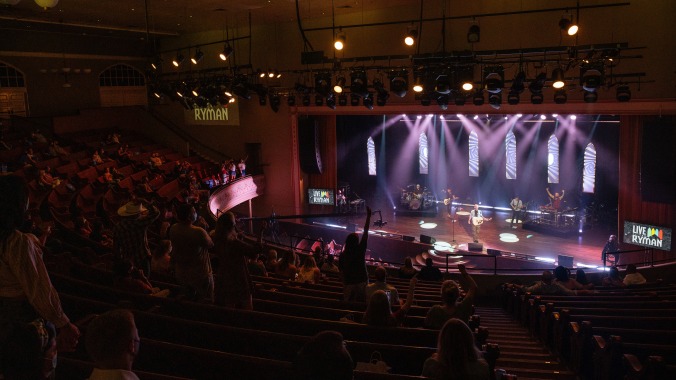When it comes to saving the pandemic-ravaged touring industry, artists and producers are pretty much throwing any and everything at the wall and seeing what sticks, from the increasingly popular virtual concert, to drive-ins, to that one intriguing bubble show, to whatever the hell is happening in Fortnite these days. It’ll be a long time before we see concerts revert to the days of yore (if we even want to return to that veritable cesspool of germs and funk, that is) but a study out of Germany offers a little bit of hope when it comes to certain dreams of enjoying performances in the wild again.
According to the New York Times, a team of researchers at Martin Luther University Halle-Wittenberg conducted a test event that included over 1,200 masked attendees and an indoor venue. Over the course of ten hours, the group ran multiple simulations to test how air ventilation, entry and exit protocols, activity during intermissions, and various patterns of distanced seating impacted contact and exposure to aerosol droplets. For example, one test attempted to replicate proper ventilation by sucking fresh air into the venue via jet nozzles as opposed to leaving the nozzles off. A computerized model of the results showed that ten times as many people would be exposed to an infectious person’s potential droplets in the second test compared with the first, hinting that regular circulation of air could dramatically decrease the density of any viruses in contaminated aerosols. And as common sense-wielding folks have been trying to stress since March, proper distancing also decreased the chances of contamination.
“There is no argument for not having such a concert,” Dr. Michael Gekle, part of the team who conducted the study, surmised in an interview. “The risk of getting infected is very low.”
Other scientists are questioning the legitimacy of the experiment, deeming the results “useful,” but not conclusive since the results are based on only one event and the study was not peer reviewed. One expert—Paul Linden, a professor of fluid mechanics at University of Cambridge—questioned the computer model used to assess the ventilation, as it “had not taken into account factors such as heat rising from an audience or indoor air turbulence, and that it was difficult to pinpoint whether it was the pattern of air flow or less ventilation in the venue that led to increased exposure to aerosols.” The research team maintains that proper protocols such as requiring masks and basic hygiene should effectively fight the spread. At minimum, it does show enough promise for us to at least fantasize about a music event that doesn’t require us to honk excitedly from our cars.










![Rob Reiner's son booked for murder amid homicide investigation [Updated]](https://img.pastemagazine.com/wp-content/avuploads/2025/12/15131025/MixCollage-15-Dec-2025-01-10-PM-9121.jpg)

























![HBO teases new Euphoria, Larry David, and much more in 2026 sizzle reel [Updated]](https://img.pastemagazine.com/wp-content/avuploads/2025/12/12100344/MixCollage-12-Dec-2025-09-56-AM-9137.jpg)




